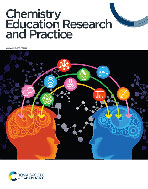Development and implementation of chemistry mindset modules in two general chemistry courses at a hispanic-serving institution: an exploratory study†
Abstract
Retention and underrepresentation of diverse ethnic groups have been and continue to be problematic in the science, technology, engineering, and mathematics (STEM) disciplines in the United States. One foundational course that is required for all STEM majors is general chemistry. One way to increase retention and diversity in STEM majors is by targeting students’ social-psychological beliefs about their academic success through the implementation of social-psychological interventions. These short impactful exercises aim to change students’ thoughts, feelings, and beliefs about their academic success and affective characteristics. In this exploratory study, we designed and implemented two chemistry specific growth-mindset modules (GMMs) in two first-year chemistry courses (general chemistry 1 (GC1) and general chemistry 2 (GC2)) at a Hispanic-Serving Institution (HSI). Students worked on the GMMs asynchronously at two specific time points throughout the semester. Using a mixed-methods approach, we assessed students’: (i) changes in mindset beliefs, chemistry self-efficacy (CSE), and chemistry performance, (ii) perceptions towards failures and challenges, and (iii) perceptions on growth-mindset modules (GMM) after participation in GMMs. Overall, GC2 students shifted towards a growth mindset and away from a fixed mindset, with small to medium effect sizes detected. No statistically significant changes in GC1 students’ mindsets were detected throughout the study period. For both courses, students increased in CSE by the end of semester. Furthermore, GC1 students who participated in any portion of the GMM intervention achieved higher scores on the ACS exam compared to those who didn’t participate. Additionally, students’ written responses highlighted an improved attitudinal change towards failures and challenges after participating in GMMs. For both courses, over 95% of the students agreed that the GMMs were valuable, over 95% students indicated they developed more positive attitudes and perspectives towards challenges, and over 96% students believed they could learn challenging topics with effort, determination, and persistence. While these results show differences in performance, CSE, mindset scores, and attitudinal change after participation in GMMs, it is also important to acknowledge that self-selection into the study may be one of the factors for explaining such differences. Results and implications for practice are discussed.


 Please wait while we load your content...
Please wait while we load your content...